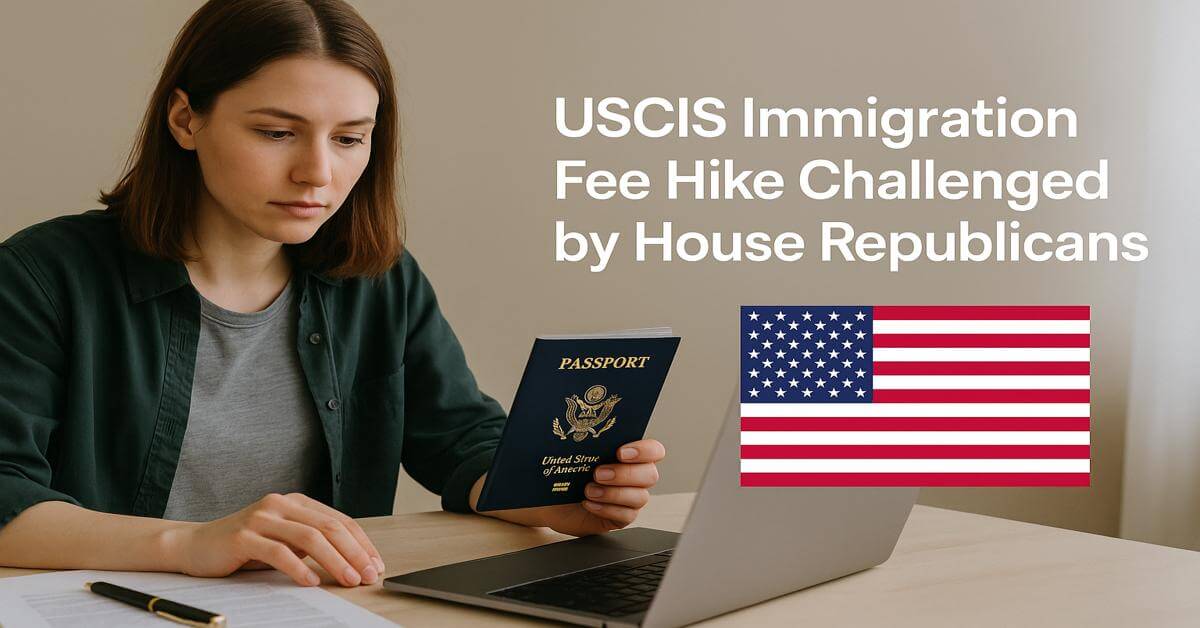House Republicans have introduced a controversial proposal that would dramatically increase fees for certain immigrant applications including charging $550 every six months to renew work permits.
This legislation, spearheaded by the House Judiciary Committee and Chairman Jim Jordan (R-Ohio), aims to raise billions to fund immigration enforcement measures, including expanding detention facilities and staffing immigration courts.
Here’s what you need to know about the proposed changes, how they compare to current policy, and what it could mean for immigrants in the U.S.
Proposed Immigration Fee Increases:
If passed, the bill would:
- Charge $550 for an initial work permit (Form I-765) application for asylum seekers, parolees, and Temporary Protected Status recipients
- Require $550 every six months to renew work permits for these groups (instead of the current ~2-year validity)
- Charge $1,000 to apply for asylum (the first fee of its kind in U.S. history)
- Impose a $3,500 fee on sponsors of unaccompanied minors
- Add a $1,000 fee for most immigrants paroled into the U.S.
- Require a $100 annual fee while an asylum case is pending
- Eliminate all fee waivers, affecting low-income applicants who previously could apply for relief
Current Costs:
| Application Type | Current Fee | Proposed Fee |
|---|---|---|
| Asylum (Form I-589) | Free | $1,000 |
| Work Permit (Form I-765 – online) | $470 | $550 (every 6 months) |
| Work Permit (Form I-765 – paper) | $520 | $550 (every 6 months) |
| TPS Work Permit Renewal | $470–$520 | $550 (every 6 months) |
| Annual Fee While Asylum Pending | $0 | $100 |
| Fee Waiver Option | Available | Eliminated |
Note: Asylum seekers currently receive free work permits and pay no application fees for asylum.
Check Also: Understanding US Immigration 90-Day Rule – Visa Implications
Reason for Changes:
Supporters argue that:
- The U.S. immigration fee structure is outdated and hasn’t kept up with processing costs.
- New fees could raise $77 billion to fund:
- Immigration and Customs Enforcement (ICE)
- Immigration court expansion
- Border enforcement facilities and staff
Rep. Jim Jordan emphasized that these changes are necessary to support the infrastructure required to handle the growing number of applications and enforce immigration laws effectively.
Expert & Humanitarian Concerns:
Potential Barriers to Protection:
- Historically, asylum has been free because applicants often flee persecution with limited resources.
- Human rights organizations argue that introducing fees for asylum could discourage legitimate applicants from seeking protection.
Critics Say:
- The proposal criminalizes poverty by removing fee waivers.
- Increased costs and shortened permit validity (6 months) could overburden both immigrants and USCIS, leading to processing delays and legal uncertainty.
Affected Groups:
Primarily impacted groups:
- Asylum seekers
- Parolees
- Temporary Protected Status (TPS) recipients
- Sponsors of unaccompanied children
Groups not explicitly mentioned in the proposal (and may not face these new costs unless changes are expanded):
- DACA recipients
- Adjustment of status applicants
- Employment-based visa holders
What Happens after USCIS Immigration Fee Hike Challenged by House Republicans 2025?
This proposal is not yet law. It must:
- Pass the full House of Representatives
- Be approved by the U.S. Senate
- Be signed by the President
Until then, the current fee structure remains in effect.
Takeaways for Immigrants:
- Stay updated: This is a proposal and may be amended or rejected.
- File applications early: If you qualify under the current system, it may be wise to apply before fees potentially increase.
- Seek legal help: Immigration attorneys or nonprofits can guide you through application processes and timelines.
Frequently Asked Questions:
-
Will fee waivers still be available?
No. The proposed law would eliminate fee waivers, which are currently available to low-income applicants, including asylum seekers.
-
How often do work permits need to be renewed now?
Currently, most work permits are valid for up to 2 years. Under the proposed law, asylum seekers, parolees, and TPS recipients would need to renew every six months, significantly increasing the burden.
-
Who introduced the proposal?
The legislation was introduced by the House Judiciary Committee, led by Chairman Jim Jordan (R-Ohio). The proposal is part of a broader effort to increase funding for immigration enforcement.






